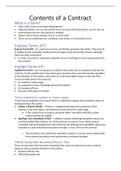Summary
Summary GDL Contract and Land Law Distinction Notes ULAW
- Module
- Contract Law
- Institution
- University Of Law (ULaw)
GDL Contract and Land Law Note from the provided materials, together with lectures. Boiled down to the most essential stuff and were amended post-exam to make sure they are focused. I have obtained 80% in both of these modules.
[Show more]



